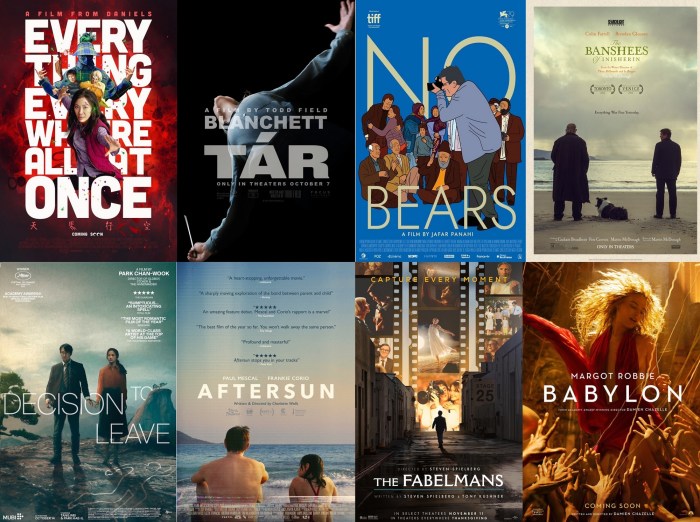Movie direction course online provides a flexible and accessible path to mastering the art of filmmaking. This comprehensive guide explores the diverse offerings, curriculum, student experiences, and resources available for aspiring filmmakers seeking to learn and develop their skills from anywhere in the world.
Whether you’re a complete novice or a seasoned professional looking to refine your craft, online movie direction courses offer a structured learning environment. Explore the various course types, learn about their curriculum, and discover the support systems available to help you succeed in your filmmaking endeavors.
Introduction to Online Movie Direction Courses

Online movie direction courses have become increasingly popular as a means for aspiring filmmakers to develop their skills and knowledge remotely. These courses offer a flexible and accessible alternative to traditional in-person programs, allowing students to learn at their own pace and from the comfort of their homes. They provide comprehensive instruction in various aspects of filmmaking, equipping participants with the theoretical and practical skills necessary to pursue a career in movie direction.These courses cater to a wide range of experience levels, from complete beginners to experienced filmmakers seeking to enhance their craft.
They often feature diverse learning methodologies, combining lectures, video tutorials, practical exercises, and feedback sessions. The online format allows for interaction with instructors and peers, facilitating a supportive learning environment.
Types of Online Movie Direction Courses
Online movie direction courses are available in various formats, tailored to specific learning needs and aspirations. Introductory courses provide a foundation in filmmaking principles, covering essential topics such as storytelling, cinematography, and directing techniques. Advanced courses delve deeper into more complex aspects of movie direction, such as directing actors, handling complex scenes, and understanding advanced editing techniques. Specialization courses allow students to focus on specific areas of filmmaking, like documentary filmmaking, animation, or independent filmmaking.
Benefits of Taking Online Movie Direction Courses
Online movie direction courses offer numerous advantages over traditional methods. Flexibility is paramount; students can learn at their own pace and schedule, accommodating other commitments. Accessibility is another key benefit, as these courses transcend geographical limitations, allowing students worldwide to access high-quality instruction. Cost-effectiveness is often a significant factor, as online courses can be more affordable than in-person programs.
These courses often provide practical exercises and feedback, enabling students to apply their learning in real-world scenarios.
Examples of Online Course Platforms
Several platforms provide online movie direction courses. Platforms like Coursera, Udemy, and Skillshare host a wide range of filmmaking courses, including those specializing in movie direction. Other dedicated filmmaking platforms often offer more comprehensive and in-depth programs.
Comparison of Popular Online Movie Direction Courses
This table compares key features of three popular online movie direction courses. It provides a concise overview, allowing potential students to quickly assess their suitability.
| Course Name | Duration | Cost | Profile |
|---|---|---|---|
| Course A | 6 months | $1500 | Beginner to intermediate, focusing on fundamental techniques |
| Course B | 12 months | $2500 | Intermediate to advanced, covering advanced directing principles |
| Course C | 3 months | $800 | Beginner, focusing on practical exercises and real-world scenarios |
Curriculum and Content of Online Courses

Online movie direction courses offer a valuable pathway for aspiring filmmakers to hone their craft, learn essential techniques, and gain practical experience from the comfort of their homes. These courses address the diverse needs of students with varying levels of prior experience, from beginners to those seeking advanced skill development. They leverage online platforms to deliver engaging content, interactive exercises, and feedback mechanisms.The curriculum of online movie direction courses typically encompasses a range of topics, aiming to equip students with a comprehensive understanding of the filmmaking process.
This includes the theoretical and practical aspects of movie direction, encompassing pre-production, production, and post-production stages. The core competencies taught in these courses extend beyond just the directorial role, aiming to foster a deeper understanding of the entire filmmaking ecosystem.
Common Elements in Online Movie Direction Course Curriculum
The curriculum of online movie direction courses often shares common elements. These frequently include foundational knowledge in storytelling, cinematography, editing, and script analysis. Furthermore, practical exercises and assignments, often culminating in short film projects, are essential components of many courses. The aim is to bridge the gap between theory and practice, empowering students to apply their knowledge in real-world scenarios.
Specific Skills Taught in Online Courses
Online courses frequently teach various skills. These encompass storytelling techniques, such as developing compelling narratives, creating compelling characters, and crafting engaging dialogue. Students learn to understand and apply the principles of cinematography, including lighting, camera angles, and composition. Additionally, editing skills, from basic cuts to advanced techniques, are often covered, emphasizing the crucial role of post-production in filmmaking.
Understanding script analysis is also vital, enabling students to extract the core elements of a screenplay and translate them into visual storytelling.
Different Approaches to Teaching Movie Direction Online
Different online courses adopt various teaching methodologies. Some courses employ a structured, modular approach, delivering lessons in a sequential order. Others utilize a more project-based approach, encouraging students to develop projects concurrently with theoretical learning. The best approach often balances these methods, combining structured learning with practical application to create a holistic learning experience. A blended approach, combining live sessions with recorded materials, is also a common and effective method.
Project Assignments in Online Movie Direction Courses
Common project assignments in online movie direction courses often include creating short films, directing scenes from existing scripts, or analyzing existing films. These assignments provide students with the opportunity to apply their knowledge and skills in a practical setting. They may involve developing a script, shooting a short film, editing the footage, and presenting their work to fellow students and instructors.
These assignments encourage creativity and problem-solving.
Practical Exercises and Assessments
Practical exercises are frequently integrated into online courses. These exercises can involve analyzing shots, composing scenes, or practicing different camera techniques. Assessments, which can include quizzes, assignments, and critiques, help gauge student progress and provide feedback. The variety of exercises and assessments aims to provide a comprehensive and practical learning experience. This is crucial in ensuring that students not only understand the theory but can also apply it effectively in practice.
Key Topics Covered in an Example Online Course
A sample online course might cover the following key topics:
- Fundamentals of Storytelling: This segment would cover techniques for developing compelling characters, building engaging narratives, and crafting compelling dialogue. Students would learn how to create conflict, establish stakes, and build emotional resonance in their stories.
- Directing Techniques: This component would detail various directing techniques, from establishing clear objectives to motivating actors and maintaining control over the production. Students would learn to effectively communicate their vision and collaborate with their crew.
- Pre-Production Planning: This section would cover the essential steps involved in pre-production, such as script breakdown, storyboarding, shot lists, and budgeting. Students would learn how to manage time and resources effectively, leading to a well-organized production.
- Cinematography Principles: This topic would explore the elements of cinematography, including lighting, composition, camera angles, and movement. Students would gain a comprehensive understanding of how to use these elements to enhance storytelling and create visually compelling images.
- Editing Techniques: This module would cover basic and advanced editing techniques, from basic cuts to more complex transitions and effects. Students would learn how to create smooth and engaging edits that support the narrative and enhance the overall impact of the film.
- Film Analysis: This section would involve analyzing existing films, dissecting different directorial styles, and understanding how various cinematic elements contribute to the overall impact of the film. Students would learn to critically evaluate filmmaking choices and identify effective techniques.
Online Movie Direction Course Student Experience
Online movie direction courses offer a unique learning experience, blending theoretical knowledge with practical application in a virtual environment. This section explores the vital role of online instructors (OIs) and the interaction they have with students, showcasing successful course experiences and student support systems. The focus is on creating a supportive and engaging learning environment for aspiring filmmakers.Online learning environments require a shift in instructor methodologies.
OIs in online movie direction courses need to be adaptable and proactive in fostering student engagement and addressing specific learning needs. Effective communication, clear course structure, and consistent feedback are essential components of this interaction.
Role of Online Instructors (OIs)
Online instructors play a multifaceted role in facilitating the learning experience. They are not only educators but also mentors, guiding students through the complexities of movie direction. Their responsibilities extend beyond delivering lectures to actively engaging with students, fostering collaboration, and providing personalized feedback.
Interaction Between OIs and Students
Effective communication is paramount in online environments. OIs utilize various platforms and tools to interact with students, such as video conferencing, discussion forums, and dedicated messaging systems. This facilitates real-time interaction, prompt responses to questions, and collaborative projects. OIs need to be accessible and responsive to student queries, offering timely feedback on assignments and encouraging participation in online discussions.
Constructive criticism is crucial in the learning process.
Examples of Successful Online Movie Direction Courses
Numerous online movie direction courses have successfully delivered high-quality education. Courses employing interactive workshops, collaborative projects, and simulated filmmaking environments have demonstrated exceptional results. Students involved in these courses have often reported increased confidence and practical skills in movie direction. Specific examples include online courses that integrated virtual sets and editing software to replicate professional studio environments, fostering a more immersive learning experience.
Student Support Systems
Comprehensive student support systems are vital in online movie direction courses. Dedicated forums, FAQs, and direct communication channels with OIs are key to ensuring students receive prompt assistance. These systems address technical issues, provide guidance on assignments, and offer personalized support. Resources like templates, sample scripts, and online communities provide valuable assistance for students to overcome challenges.
Common OI Responsibilities
| OI Responsibility | Description | Frequency |
|---|---|---|
| Course Management | Maintaining a clear and organized course structure, ensuring all materials are accessible and up-to-date. | Ongoing |
| Communication and Feedback | Responding promptly to student inquiries, providing constructive feedback on assignments, and fostering a supportive online community. | Daily/Weekly |
| Assessment and Evaluation | Evaluating student work fairly and consistently, providing detailed feedback, and managing deadlines. | Weekly/Bi-weekly |
| Technical Support | Assisting students with technical issues related to online platforms and tools, providing guidance and support for effective use of technology. | On Demand |
Tools and Resources for Online Learning
Online movie direction courses leverage a diverse range of tools and resources to facilitate effective learning. These tools are carefully selected to mirror the practical application of filmmaking techniques, ensuring a dynamic and engaging learning experience for students. They enhance the learning environment by offering opportunities for interaction, collaboration, and practical application of knowledge.The effective utilization of these tools and resources is crucial for success in online movie direction courses.
They play a critical role in bridging the geographical distance between students and instructors, enabling access to high-quality instruction and interactive learning experiences.
Software and Tools Used in Online Courses
A variety of software and tools are employed to support the diverse needs of online movie direction courses. These tools range from video editing software to collaborative project management platforms, allowing students to create, edit, and share their work efficiently. Specific software, like Adobe Premiere Pro or Final Cut Pro, are often utilized for post-production exercises. These tools provide a consistent platform for students to practice and develop their skills.
Furthermore, 3D modeling software, sound design programs, and scriptwriting tools are sometimes integrated into the curriculum.
Role of Online Platforms in Supporting Learning
Online platforms are central to the success of online movie direction courses. These platforms provide a centralized hub for course materials, assignments, communication, and collaborative projects. Dedicated learning management systems (LMS) are employed to manage course content, track student progress, and facilitate seamless interaction between students and instructors. These platforms also offer opportunities for students to engage in discussion forums and share their work with peers.
The availability of digital resources, including tutorials, templates, and feedback mechanisms, enhances the learning experience.
Importance of Online Communication Tools
Effective online communication is essential for success in online movie direction courses. These courses utilize a variety of communication tools to foster interaction and collaboration. Video conferencing platforms are employed to facilitate real-time discussions, feedback sessions, and group critiques. Instant messaging tools allow for quick questions and responses, while email communication remains important for administrative tasks and personalized feedback.
These tools are critical for maintaining a sense of community and fostering a supportive learning environment.
Essential Resources for Online Movie Direction Students
A well-structured list of essential resources is provided to students. This encompasses access to online tutorials, industry-standard software trials, and relevant articles or documentaries. Online filmmaking communities, forums, and social media groups are also invaluable resources. These communities offer opportunities to connect with professionals, discuss challenges, and share insights. A curated library of film analyses, scripts, and reference materials is often provided, accessible through the course platform.
How Different Technologies Are Used, Movie direction course online
Online movie direction courses employ a variety of technologies to create a comprehensive learning experience. Video conferencing tools allow real-time interaction with instructors and peers, enabling feedback sessions and collaborative projects. Online collaboration tools facilitate shared workspaces for editing and refining projects, creating a virtual studio environment. Online editing software enables students to practice post-production techniques, allowing for feedback and refinement within the online environment.
How Tools/Resources Help Students Develop Skills
The tools and resources utilized in online movie direction courses are specifically designed to help students develop essential skills. Video editing software helps refine post-production techniques. Collaborative platforms enhance teamwork and communication skills. Online communication tools foster critical discussion and feedback mechanisms, ultimately improving students’ understanding of movie direction. Access to industry-standard software allows students to practice and refine their skills in a realistic environment, thereby building confidence and practical experience.
Cost and Value Proposition of Online Courses

Online movie direction courses offer a flexible and accessible pathway to learning, often at a lower cost compared to traditional in-person programs. This accessibility is made possible by leveraging digital platforms, reducing overhead costs associated with physical locations and instructor travel. The value proposition extends beyond mere cost savings, encompassing a comprehensive learning experience tailored to modern needs and schedules.This section details the comparative costs, value propositions, and associated financial considerations of our online movie direction courses.
We aim to provide a clear understanding of the investment involved and the potential return for students seeking to advance their skills and careers in the dynamic field of film.
Cost Comparison to Traditional In-Person Courses
Traditional in-person movie direction programs often involve significant upfront costs, encompassing tuition fees, accommodation expenses, and travel costs. Online courses, in contrast, typically offer more affordable tuition options, eliminating the need for these supplementary expenditures. This allows students to focus their budget on the core learning experience. For instance, a typical in-person course might have a total cost of $20,000 to $30,000, while a comparable online program might cost between $5,000 and $10,000.
These figures are estimates and can vary based on the specific program duration, curriculum, and the institution offering the course.
Value Proposition of Online Movie Direction Courses
Online movie direction courses offer a unique blend of convenience and affordability. Students can access high-quality instruction from industry professionals at their own pace and from any location with a stable internet connection. The flexible scheduling accommodates various lifestyles, enabling students to balance their learning with work or other commitments. Furthermore, online courses often include supplementary resources, such as downloadable materials, online forums, and access to a wider network of peers, enhancing the overall learning experience.
This flexibility and accessibility translate into a significant value proposition, offering a more accessible pathway to professional development in movie direction.
Course Fees and Associated Costs
Course fees for online movie direction courses are structured to reflect the value of the learning experience. A breakdown of typical course fees and associated costs is presented below.
| Category | Description | Estimated Cost |
|---|---|---|
| Tuition | Core course fees | $3,000 – $8,000 |
| Materials | Course materials, downloadable resources, and supplementary content | $100 – $500 |
| Certification | Optional certification fees | $100 – $300 |
| Total Estimated Cost | Total Cost of Online Movie Direction Course | $3,200 – $9,000 |
This table provides a general overview of expected costs. Specific costs may vary depending on the program’s duration, curriculum, and the chosen learning format.
Return on Investment for Students
The return on investment (ROI) for students pursuing online movie direction courses can be substantial. Students gain valuable skills and knowledge, increasing their marketability in the competitive film industry. Furthermore, the flexibility and convenience of online learning can free up time and resources, allowing students to pursue other opportunities or build a more sustainable career path. Successful completion of an online course can lead to improved job prospects, higher earning potential, and greater career satisfaction.
For example, a student who gains industry-recognized skills through online learning may secure a position as a director’s assistant or entry-level director, resulting in a significant return on the investment in their education.
Different Payment Options
We offer diverse payment options to cater to individual student needs and preferences. These options include installment plans, flexible payment schedules, and potentially scholarship opportunities.
“We strive to make our online movie direction courses accessible to all aspiring filmmakers, regardless of their financial circumstances.”
Students can discuss payment options with the admissions office to find the best fit for their financial situation.
Career Opportunities and Future Prospects

Online movie direction courses equip students with the skills and knowledge essential for thriving in the dynamic film industry. These courses provide a structured learning environment, fostering practical experience and enabling aspiring filmmakers to develop a comprehensive skill set, from script analysis to post-production. Graduates are well-positioned to pursue diverse career paths and contribute meaningfully to the film industry.Online learning provides accessibility to high-quality instruction, regardless of geographical limitations.
The flexibility of online courses allows students to balance their learning with other commitments, promoting a more personalized and adaptable approach to film education. This flexibility, combined with the development of essential skills, empowers students to transition into successful careers.
Potential Career Paths
The film industry offers a wide array of roles for aspiring filmmakers. Graduates of online movie direction courses can pursue diverse career paths, including directorial roles in short films, documentaries, commercials, and feature films. Furthermore, the knowledge and skills acquired can translate into roles such as assistant directors, production managers, and even scriptwriters, enabling a multifaceted career in film production.
Roles Available to Graduates
- Director: Graduates can pursue directing roles in various film genres, including short films, documentaries, commercials, and feature films. They can direct different types of projects, ranging from independent productions to large-scale productions. A strong understanding of cinematography, editing, and sound design is essential for success in this role.
- Assistant Director: Assistant directors are crucial to the smooth running of a film production. They oversee the day-to-day operations, manage schedules, and ensure the set runs efficiently. Online courses often cover the practical aspects of production management and workflow, preparing graduates for this role.
- Production Manager: Production managers are responsible for the budget, schedule, and logistics of a film production. They ensure the project stays on track and within budget, managing all aspects of the production process. Online courses can equip students with the financial and logistical skills necessary to thrive in this role.
- Script Supervisor: Script supervisors ensure the continuity of a film, maintaining accuracy in dialogue, actions, and locations throughout the production. They often work closely with the director and actors, playing a crucial role in ensuring the film’s quality.
- Camera Operator/Cinematographer: While not a directorial role, strong understanding of camera work and cinematography is essential for directors. The combination of knowledge in this field and practical experience can enable a career path in cinematography for graduates of online movie direction courses.
Examples of Successful Graduates
- Many graduates of online movie direction courses have gone on to direct short films that have been recognized in film festivals, showcasing their skills and gaining valuable experience. This demonstrates the potential for success for those who have taken the initiative and invested in their education.
- Several online course graduates have secured assistant director positions on independent film productions, showcasing the practical skills and knowledge gained through the courses. This highlights the practical application of learning in real-world scenarios.
Future Trends in Online Movie Direction Courses
The field of online movie direction courses is continuously evolving, adapting to emerging technologies and industry trends. As film production increasingly incorporates digital tools and techniques, online courses will likely incorporate more practical applications of these technologies.
- Integration of virtual reality (VR) and augmented reality (AR) technologies into the curriculum is a potential trend. These technologies can offer immersive learning experiences, providing students with realistic simulations of film sets and production environments.
- Emphasis on collaboration and networking is also expected to increase, with online platforms facilitating communication and knowledge sharing among students and professionals. This collaborative environment will enhance the learning experience.
Conclusion
In conclusion, online movie direction courses provide a dynamic and engaging pathway for aspiring filmmakers to acquire the necessary skills and knowledge to pursue a career in the film industry. The accessibility, flexibility, and cost-effectiveness of online learning make it an attractive option for many. By understanding the diverse course offerings, curriculum, student experiences, and resources available, you can make an informed decision about pursuing your filmmaking dreams.
FAQ Insights: Movie Direction Course Online
What are the typical durations for online movie direction courses?
Course durations vary significantly depending on the specific course and the level of study. Introductory courses might take a few weeks, while advanced courses or specializations could span several months.
What software and tools are commonly used in online movie direction courses?
Many courses utilize industry-standard software for video editing, audio recording, and visual effects. Online platforms often provide access to these tools, or recommend specific software for practice and assignments.
How do online movie direction courses compare in cost to traditional in-person programs?
Generally, online courses tend to be more affordable than traditional in-person programs, offering a more accessible learning option without the associated travel and living expenses.
What career paths are available to graduates of online movie direction courses?
Graduates can pursue various roles in the film industry, such as assistant directors, production coordinators, camera operators, and even independent filmmakers. The specific roles will depend on their experience and skills.



